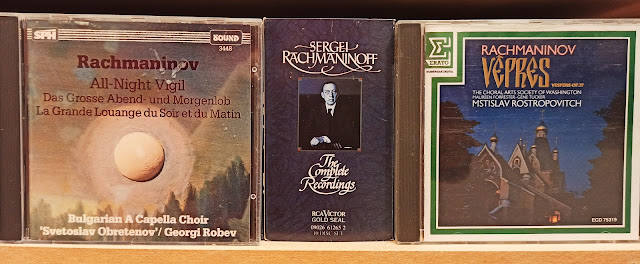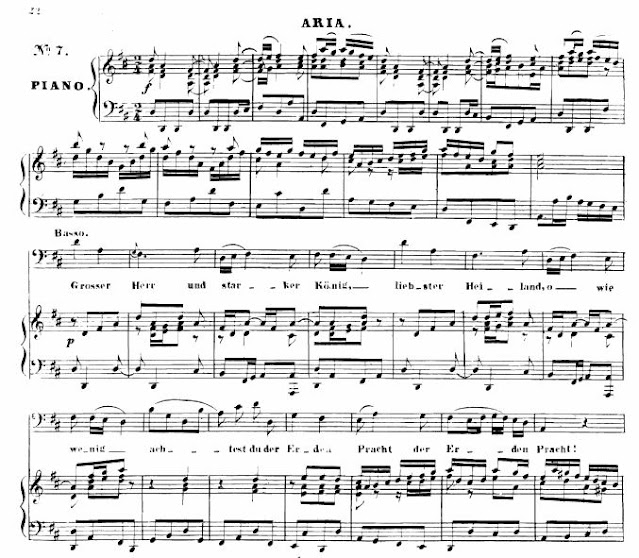Rachmaninoff's Vespers, Op. 37
The music of Rachmaninoff is usually associated with his virtuoso writing for the piano, the composer's instrument of choice and for which he wrote most of his music. You may have seen in the Hollywood movie Shine how David Helfgott went crazy trying to learn "Rock 3" (his father's ambitious nature didn't help), but the concerto that used to bring concert pianists of the 20th century to their knees is now considered standard repertoire for conservatory students.
The gentle giant among the composers wrote other music, too. Among my very favorite of all works for orchestra is his Second Symphony, and the piece I'd like to present today is neither for the piano nor for the orchestra: his Op. 37, the All-Night Vigil or Vespers.
I discovered this piece when the CD recording with Mstislav Rostropovitch and Maureen Forrester was released in 1987. I had the opportunity to ask the Canadian contralto soloist how it was to work with the Russian master musician on this recording. She said, "I asked him how I should interpret my solo part. He told me to think of the saddest thing I can imagine and then start singing. That was his advice. That's how it should sound."
 |
| This is me in Charleston, WV, talking to Maureen after she performed Mahler's Das Lied von der Erde. |
I love Maureen Forrester's voice whether she is singing Bach, Händel, Brahms, Schumann, Mahler or Rachmaninoff, so I can't objectively say whether she captures the essence of this Russian masterpiece, but if Slava chose her to sing with him again and again (I had heard them team up for Mahler 3 a few years previously), then that's good enough for me. However,the New York Times critic was not impressed by this ensemble's Carnegie Hall performance under Rostropovich's baton, saying that even with 67 basses in the 205-strong choir lacked "the solid, cavernous bass tones that form the bedrock of any Slavic chorus. Rachmaninoff's Vespers descend at one point to a B-flat below low C, and that note on this occasion was a toneless gargle." (NB: Maureen didn't sing in that performance.)
Singing bass myself, I can attest to the fact that the low B-flat is impossible for me and most other mortals to sing. So when I discovered the Bulgarian A Capella Choir's recording, I understood what a difference it makes to have immortal singers - or at least Eastern European basses - performing this hour-long opus. Rachmaninoff's style of writing for a choir of a capella voices is fairly orchestral. He doubles and triples some voices, sends others on solo jaunts and highlights still others with dynamic changes. From my experience with his major works, I'd have to put him in a class with Sibelius, Strauß and Mahler for his orchestra-writing prowess. This piece is no less special to me than those composers' best works.
Just about a year ago - thanks to Spotify - I discovered that Tchaikovsky also wrote an All-Night Vigil (his Op. 52) and the work is nearly as thrilling as Rachmaninoff's. One hears similar melodies and harmonies, I assume based on the traditional liturgical pieces. Definitely also worth a listen!
Unfortunately, Rachmaninoff's Vespers are not performed often. When sung all together, they are too demanding for most amateur choirs. Professionals perform them once in a blue moon in concert halls, which is somewhat unfortunate as well because liturgical music often lives from the ambiance of the church. This rendition recorded by the WDR Rundfunkchor captures some of the drama and beauty of a live performance - parts are even choreographed and it is nicely filmed.
Finally, I'll share with you what many music critics believe to be the ultimate recording of this piece: Robert Shaw conducting the Robert Shaw Festival Singers, which can be heard here. And if deep bass voices turn you on, check out this recording of the Choir of the Academy of Choral Art named after V.S. Popov supported by the oktavists Yuri Wichniakov and Vladimir Miller.




Comments
Post a Comment